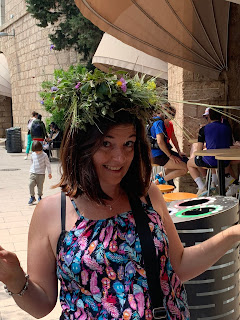
The Lisbon project meeting purpose was to explore different green places, from Natural Parks to small gardens, activate knowledge, reflect together and come to conclusions about how we can find the right balance between man and nature and protect and restore our environment.
The activities planned for the meeting included multinational teams of teachers and students from the different countries involved promoting collaborative work among everyone. Each team divided tasks, took notes, used new technologies, creativity and skills to give their contribution to the project.
 |
Collelcting seeds at Bela Vista Park
|
The first day started at school with a welcome moment with ice-breaking activities to welcome and strengthen the bonds of friendship and exchange of experiences. A guided tour to the school was carried out and later the students and teachers were led through the School Open Day Activities that were taking place, on the topic Water. Then, the group went for a walk to Bela Vista Garden to collect different seeds of natural species. It was also an opportunity to walk around, sharing with nature and enjoying the view over Lisbon.
 |
The wetlands of EVOA - Tagus estuary
|
The second day was a Day Trip to the Tagus Estuary Natural Reserve, EVOA – Tagus Estuary Birdwatching and Conservation Area, which allowed the group to know and enjoy the unique heritage between the Lezíra and the Tagus Estuary. There, students and teachers got to know the permanent exhibition – EVOA, Where the World Meets the Tagus – and participated in the different activities that are complementary to birdwatching, as for example the recognition of the contrast between landscapes, the relation between tradition and innovation and the variety of species that feed and take refuge in the canals, in the agricultural fields and in the Lezíria’s pasture lands. There, it was possible to develop activities that reflect the relation between man and nature in order to keep a balanced sustainability. On the third day, students spent their time with the host families and host students, and it was time for cultural sharing.
 |
Gulbenkian Park
|
On the fourth day, the group had a guided tour through Calouste Gulbenkian Garden, one of the most emblematic gardens of the Portuguese modern movement and a guided walk through The Green Corridor project of Monsanto, designed over three decades, and it was possible to get acquainted with two ciclopedonais gardens, horticultural Park pasturelands, cornfields, viewpoints and parks for physical maintenance.
 |
Olivais Pedagogical Farm
|
In the last day, students reflected and shared ideas about nature, in groups. Reflections were made in the mother tongue and then shared in English. A group of students from the Multimedia Professional Course was recording and reporting on the entire activity for later sharing. Then, the group visited Olivais Pedagogical Farm. In addition to discovering the variety of animals that live there, the group participate in a composting and planting activity. The Lisbon meeting ended with sharing moments in a Farewell party.
 |
Street art nade of plastic garbage
|
























.jpeg)

.jpeg)
.jpeg)
.jpeg)
.jpeg)

.jpeg)

.jpeg)
.jpeg)




.jpeg)
.jpeg)
.jpeg)

.jpeg)
.jpeg)
.jpeg)
.jpeg)
.jpeg)
.jpeg)

